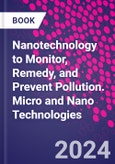For decades an increasingly rapid urbanization pace, modern industrial development, and constantly intensive agricultural practices have caused controlled or uncontrolled release of hazardous contaminants that seriously threaten our environment. All natural spheres (atmosphere, hydrosphere, biosphere, lithosphere, and anthroposphere) seem to have been exposed to harmful practices and emerging research in nanomaterials is now trying to combat their adverse impact on physical ecosystems and organisms, as well as human health. In this context, pollution remediation at the nanoscale has come to the forefront for its potential to unlock sustainable, highly efficient, and cost-effective technologies, capable to restore in situ or ex situ land, water, and air resources.
Nanotechnology to Monitor, Remedy, and Prevent Pollution covers design, fabrication, and extensive applications of engineered nanostructured materials in various shapes and morphologies (such as nanoparticles, wires, tubes, fibres) that, because of their size, surface-to-volume ratio, and high reactivity, function as catalysts and adsorbents of organic pollutants (aliphatic and aromatic hydrocarbons), gases, chemicals (arsenic, manganese, iron, nitrate, heavy metals), antibiotics, and biological entities (bacteria, viruses, parasites). Their integration with biotechnological processes for monitoring and prevention of pollution is also explored alongside the invisible dangers caused by noise.
This is a valuable book for academics, researchers, undergraduate and postgraduate students working on environmental engineering for sustainability, environmental sciences, biotechnology, and nanotechnology.?
Please Note: This is an On Demand product, delivery may take up to 11 working days after payment has been received.
Table of Contents
Part I Fundamentals1. Advanced nanomaterials: An introduction
2. Nanotechnology to monitor, remedy, and prevent pollution: An introduction
3. Ecological and toxicological effects of nanotechnology
Part II Nanotechnology against noise pollution
4. Nanomaterials with enhanced acoustic properties: An introduction
5. Nanotechnology against noise pollution
6. Environmental noise pollution and sources
Part III Nanotechnology against air pollution
7. Nanotools for air remediation: An introduction
8. Nanosensors for air quality monitoring
9. Nanosensors to detect and quantify air pollutants
10. Resistive nanosensors for monitoring air pollution
Part IV Nanotechnology against water pollution
11. Micropollutants in water and their adverse effects on environment and human life
12. Nanoremediation of plastic-based waste materials
13. Photonanocatalysts for water purification
14. Removal of pharmaceuticals, cosmetics, and toiletries from water by nanomaterials
15. Electrochemical oxidation at the nanoscale for xylene destruction in wastewater and model aspect
16. Environmental micropollutants and removal techniques
17. Value-added products from wastewater
18. Nanotechnology for removal of personal care products and related compounds
19. Micropollutants in aquatic systems
Part V Nanotechnology against marine pollution
20. Biofouling: Status and challenges in the marine environment
21. Applications of nanotechnology for remediation and degradation of petroleum pollutants in environment: A special emphasis on membrane technology
22. Chemical recycling of plastic waste for sustainable development
Part VI Nanotechnology against soil pollution
23. Nanoremediation of inorganic contaminants in soils: Applications, mechanisms of actions, and environmental implications
24. Application of nanotechnology in agriculture
25. Nanotechnology in the agricultural sector








